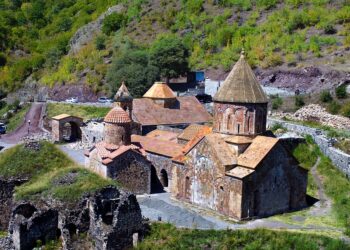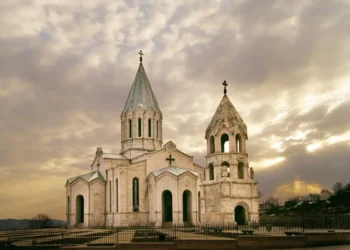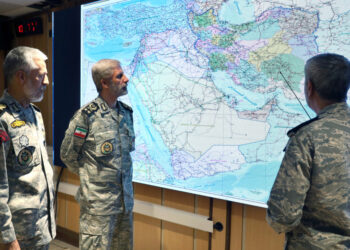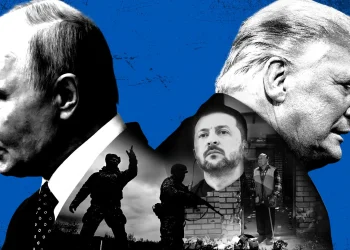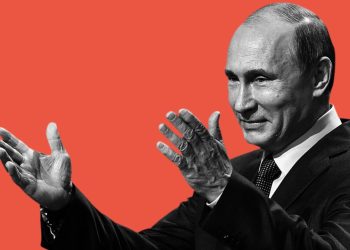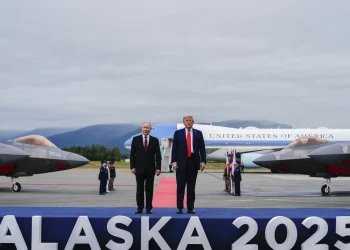MOSCOW (Realist English). It would seem that Armenia should celebrate the appearance of a famous, rich and influential person at the head of the Artsakh government. In neighboring Georgia, a billionaire who also made his fortune in Russia, hiding behind the political scenes, has been ruling the country for years. True, not everyone likes the policy he is pursuing, but no one has managed to beat him in the last election. Ruben Vardanyan’s decision to return to his homeland is an extraordinary step. I have been following his political and financial activities for a long time, so I felt it my duty to write this text and offer it for publication in my beloved Armenia.
Vardanyan is one of the founders of the famous international brokerage company Troika-Dialog. Within 20 years, he brought Troika’s financial assets from zero to almost $ 6 billion, and the company’s equity to almost $900 million. He is undoubtedly an intelligent and very capable person. It would seem that little Artsakh, which is also in the grip of a political and military crisis, the roots of which were laid by the founders of the Soviet state, has nothing more to wish for. Today, Armenia is going through one of the most difficult periods of her centuries-old history, the root cause of which is Artsakh. So, the appearance of such a bright personality as Ruben Vardanyan at the head of the government of Artsakh deserves the closest attention.
Artsakh President Araik Harutyunyan has officially announced that he has appointed Ruben Vardanyan to the post of Artsakh’s State Minister and is ready to grant him broad powers to make decisions. Vardanyan himself stated that he was ready to take responsibility for the fate of the unrecognized republic and assumed the duties of the Minister of State. Numerous Russian commentators approve of the prospects for the emergence of a new figure on the scene of Armenian politics, noting the size of Vardanyan’s fortune, his extensive connections in the political and business circles of Russia, the United States, France, and Mr. Vardanyan’s abilities. However, as the experience of Donald Trump has shown, business and politics are not exactly the same thing.
Ruben Vardanyan’s business biography gives reason to think about the methods of building his “empire”, the stories about which were loudly voiced in international investigative journalism. Vardanyan’s “landromat”, that is, simply put, a “laundry” for laundering “dirty money”, gained popularity as a result of a leak from the database of Mossack Fonseca, the world’s fourth largest offshore law firm. An investigation by the International Consortium of Investigative Journalism (ICIJ) has led to interesting conclusions. Ruben Vardanyan’s name appears in it next to the name of the famous cellist Sergei Raldugin, whom the media call a close friend of Vladimir Putin and who, according to the registrar company Mossack Fonseca, owns offshore companies in Panama. Mr. Raldugin gained fame not on stage with a cello bow in his hand, but in connection with billions carefully hidden in Panama and other exotic offshore jurisdictions. And Mr. Vardanyan provided services to numerous Russian clients, helping them to hide from the already not too strict control of tax and other law enforcement agencies. Maybe now Ruben Karlenovich has decided to share his fortune with his fellow countrymen?
In an interview given to the Russian newspaper Kommersant, the new head of the Artsakh government did not demonstrate a deep understanding of the Artsakh crisis. An attempt to force Azerbaijan to recognize the foreign policy subjectivity of Stepanakert by allowing the unrecognized republic to negotiate is doomed to failure. And this is exactly the way to solve the problem that Mr. Vardanyan suggests. Even Armenia has not yet recognized Artsakh as a sovereign state. To expect this from Aliyev, at least, is naive. The President of Azerbaijan feels like a winner today, and in his position and self-perception, it is hardly realistic to persuade him to change his position. The complex configuration of countries interested in one or another “settlement” of the crisis around Artsakh looks like this today: Turkey and Azerbaijan on the one hand, Russia in an ambivalent position, the collective West implicitly supporting Armenia, and Iran opposing Turkey in its own interests, which has become a situational ally of Armenia. The only real ally of Armenia and Artsakh in this scenario may be the collective West. However, in order to make it her ally, Armenia must take a set of measures. Russian peacekeepers no longer inspire the sides with either fear or respect. The reason is the weakening of Russia caused by getting bogged down in the war against Ukraine and the multi–vector interests of the Russian Federation, which is interested in cooperation with Turkey and Azerbaijan. This is a wake-up call for Yerevan and Stepanakert, who today perceive Russian peacekeepers as the only guarantee of security. It is clearly not necessary to count on Moscow’s help in this situation.
In accordance with the agreements of November 9, 2020, it is enough for Baku to declare that it does not want to extend the peacekeeping mission, and the peacekeepers will have to leave the region. Until recently, such a turn seemed unlikely, but news from the Ukraine and incidents like Parukh increase doubts about the long-term stay of Russian peacekeepers in the region. The weakening of Russia’s positions turned into a collapse in September, when Azerbaijani troops crossed not the “line of contact” with the unrecognized Artsakh Republic, but the state border between Armenia and Azerbaijan. Their artillery strikes reached towns and villages deep in the territory of Armenia. There have been clashes in this area before, but this time their scale was unprecedented. In two days, according to the Armenian Defense Ministry, more than 200 Armenian soldiers were killed, and the Azerbaijani Defense Ministry acknowledged the death of more than 70 Azerbaijani soldiers. In the following days, evidence of killings and torture of Armenian prisoners, including female servicemen, appeared on the web. According to the official version of Azerbaijan, the border in this area is not delimited, and, therefore, there is no reason to assert that the fighting took place on Armenian territory. But it is obvious that no matter how the border passes, cities such as the Armenian resort of Jermuk or Vardenis, located on the shore of Lake Sevan, are the internationally recognized territory of Armenia.
The most important thing in the September escalation was who stopped it. If the war of 2020 was stopped by Moscow, now the laurels of the peacemaker have gone to the West. Moreover, it turned out to be done without the involvement of the military, a few calls from Washington to Baku were enough. The CSTO responded to a direct request for help by promising to send an observer mission, which angered even pro-Russian Armenians. It would seem that Yerevan should have realized that one call from Washington means more than the entire CSTO put together. Moreover, this Russian anti-NATO is based on Russia alone, and there is no need for Armenia to expect help from Kyrgyzstan or Tajikistan. In this difficult situation, Armenia turned towards neighboring Iran, which was another mistake. Iranian Foreign Minister Hossein Amir Abdollahian, who arrived at the opening ceremony of the consulate in Kapan, even said that his country would not allow border changes in this region. But, turning to the United States for help, Armenia should remember that in Washington the alliance of Russia and Iran is called the “devil’s axis”, that Iran, which is under sanctions of the global community, is an outcast, and after the appearance of Iranian drones in the Ukrainian theater of operations, it became a direct enemy of both the United States and the European Union. The contradictions between Iran and Turkey cannot become the foundation for an Armenian-Iranian situational alliance.
Armenia’s natural ally is the collective West. And from the point of view of ideology, since the liberal world order, although it consolidates the leading role of the West, is beneficial to small countries by creating rules within which it is possible to survive. And from the point of view of strategic benefits, since the US and the EU have convincing military power and economic advantages, against which Azerbaijan has no arguments. In this regard, Pashinyan’s refusal to sign the Declaration of the CSTO summit is undoubtedly the right step. It is important that the Armenian foreign policy does not stop there, continuing to persistently knock on all Washington’s and Brussels’ doors, demonstrating the rejection of the “Russian NATO” and the “devil’s axis”. And Ruben Vardanyan’s business trip to Stepanakert seems to be short-term. He has nothing to offer the Armenian people.
Vladimir Neputin is a journalist, special to the Realist News Agency



